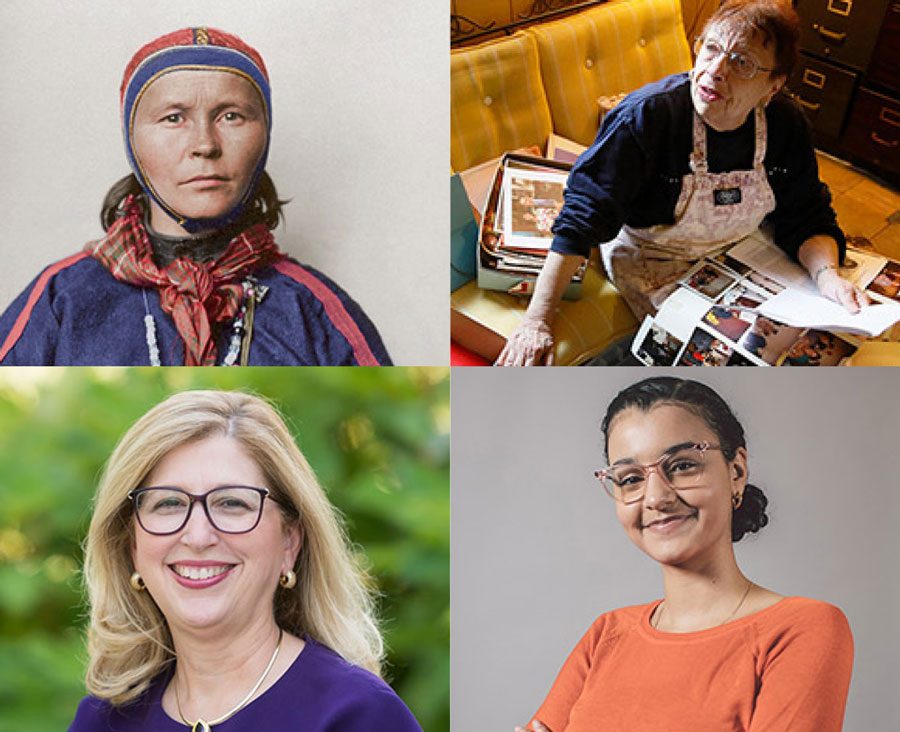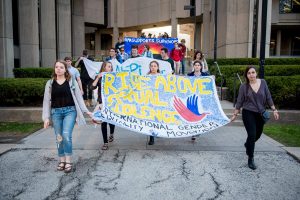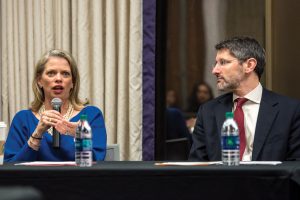Northwestern highlights exceptional women in celebration of 150 years of coeducation
October 20, 2019
This year marks the 150th anniversary of coeducation at Northwestern.
One of the ways Northwestern is celebrating the anniversary is by shining light on some of the remarkable women/womxn from the University’s past and present. These women, a group of over 100 called “catalysts” by the University’s 150 Years of Women Committee, represent diverse backgrounds and vast achievements. As the year continues, the committee hopes to keep growing the list via nominations.
“We wanted to show examples of people who are making the world a better place and making this a more equitable and inclusive community,” said University spokesperson Jeri Ward, 150 Years of Women Committee co-chair. “We hope that others will take inspiration from that and drive positive change in the future.”
Teresa Woodruff, who is both a member of the 150 Years committee and the catalyst list, sees women as an integral part of Northwestern’s strength as a university.
“They’ve been a part of the intellectual firepower that has led Northwestern to be globally recognized as an academic powerhouse,” Woodruff said. “Telling that story acknowledges presence, and that’s really critical.”
Below are profiles of four of these exceptional women.
Sophie Davis
A current junior studying journalism, design, and entrepreneurship and one of Chicago’s 25 under 25, Sophie Davis co-founded her startup, alula, during her sophomore year. The company makes lamps that simulate the sun, helping users wake up more refreshed.
“Waking up to the sun is such a calming and refreshing experience, as opposed to waking up in the dark to an alarm that startles you,” Davis said.
Davis came up with the idea in her freshman year entrepreneurship class and furthered that idea into a business through The Garage’s Wildfire, an incubator and accelerator for startups.
Davis said she’s excited to be launching preorders on the alula lamps soon. Her startup has been “one of the most defining” parts of her college experience, and she looks forward to where it will take her in the future.
Davis is also part of the Propel program, which focuses on entrepreneurship among women at Northwestern.
“It’s about fostering great relationships between women entrepreneurs,” Davis said. “Women receive less funding for their ventures than men, and women of color receive significantly less. Banding together, we can learn from each other and grow from that.”
Genevieve Forbes Herrick
Genevieve Forbes Herrick, then Genenvieve Forbes, graduated from Northwestern in 1916 and two years later began working for the Chicago Tribune.
As a female reporter in 1918, Forbes was assigned to write for society pages, but she pushed her editors to let her take more serious stories. In 1921, she convinced her superiors to allow her to cover the process of immigrating to the U.S.
Posing as an Irish immigrant, she went through the entire process of coming to America, uncovering the abuse immigrants endured at Ellis Island. Her 13-part series led the firing of the Ellis Island commissioner.
Lorraine H. Morton
After graduating from Northwestern in 1942, Lorraine H. Morton spent decades serving Evanston as an educator and public servant.
She taught at Foster School, Nichols Middle School and Chute Middle School before becoming principal of the integrated Haven Middle School.
In 1989, Morton retired from education and ran for mayor in 1993. Winning the election, she became not only the city’s first black mayor but its first Democratic one as well. Morton served as mayor for 16 years, making her Evanston’s longest serving mayor.
Morton passed away in September 2018 at the age of 99.
Teresa K. Woodruff
Teresa Woodruff is a professor of obstetrics and gynecology, molecular biosciences, and biomedical engineering at Northwestern, as well as researcher and dean of The Graduate School. Woodruff, a champion of women’s health, created a new medical field called oncofertility, a combination of oncology and fertility.
“The focus is allowing young people going through cancer treatments to maintain their reproductive health through treatment,” Woodruff said.
She also founded the Women’s Health Research Institute, which fights for inclusion of females in research studies.
“On a fundmental level, including sex as a biological variable in basic research studies is critical. It ensures that in the long run, drugs won’t be less effective or harmful for some individuals,” Woodruff said.
In addition to her work for women’s health, Woodruff was on the committee for the 150 Years of Women project. She worked on the “Hidden No More” project, which highlights impactful women from Northwestern’s faculty that have often been left out of the University’s history.
“Uncovering individuals who were part of the fabric of the University but have never been looked at before was really exciting. It helps us understand the narrative of what has led to our ability to be here,” Woodruff said.
To Woodruff, celebrating this anniversary is an opportunity to remember that women are an essential part of the University’s past, present, and future.
“My hope is that these stories give us all reason to hope that the next 150th anniversary will be more inclusive for all of us, and that the world will be better because of that,” she said.





